
Trusted by 140,000+ people for their vitamin and mineral needs

Trusted by 140,000+ people for their vitamin and mineral needs

Trustpilot score: 4.4 out of 5
Weight loss surgery and fertility
A weight loss surgery significantly affects your fertility. How does this work exactly? And why might the pill be less effective after your stomach reduction if you don't want to get pregnant? You can read about that and more here.
Overweight and fertility for women
If you have obesity, your hormones are out of balance. Fat cells, for example, produce the hormone estrogen, which plays an important role in your fertility. With obesity, you have too many fat cells, which can lead to an overproduction of estrogen.
Due to excessive estrogen levels and other factors, many women with obesity experience a disrupted menstrual cycle. As a result, many women with obesity are less fertile, making it very difficult to conceive.
Overweight and fertility for men
For men with obesity, hormone levels are also significantly out of balance, disrupting the production of the hormone testosterone. Testosterone is crucial for the quantity and quality of sperm. As a result, men with obesity also experience fertility issues.
Chances of pregnancy after a weight loss surgery
A stomach reduction helps you lose weight. Within just a few weeks, you can lose so much weight that you become much more fertile. This increases the chances of becoming pregnant. That's why many people with obesity and a desire to have children choose to undergo a weight loss surgery.
Do you want to get pregnant? The advice is to wait about 1 to 1.5 years after your weight loss surgery. By then, your body will be more stable in weight, and you will have fewer toxins in your blood. Want to know more about this? We discuss it in this blog about pregnancy after a weight loss surgery.
Protection against pregnancy after a weight loss surgery
After your weight loss surgery, your body absorbs vitamins and minerals less effectively. Unfortunately, it may also be the case that the pill is less effectively absorbed, especially after a gastric bypass, where not only your stomach is smaller, but your intestines are also rerouted.
Because the pill is less effectively absorbed, there is still a significant chance of pregnancy. So, if you do not want to get pregnant, it may be necessary to use another form of birth control.
What methods of birth control are available?
The pill is not the only way to reduce the chances of becoming pregnant. Fortunately, there are many other methods of birth control you can use if you do not want to get pregnant. Think about condoms, an IUD, or sterilization.
Do you find it difficult to determine which method of birth control works best for you? Then contact your doctor. They know you and your situation best and can provide you with personalized advice.
What if I do want to get pregnant after my weight loss surgery?
Are you eager to get pregnant after your weight loss surgery? Then read our blogs about pregnancy after a weight loss surgery and multivitamins during pregnancy. We answer frequently asked questions about pregnancy after a weight loss surgery.


